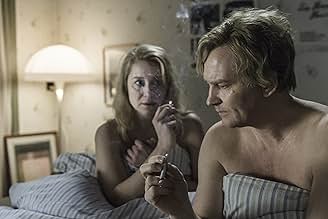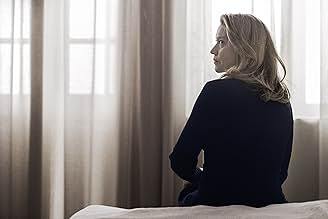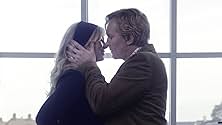ÉVALUATION IMDb
6,4/10
8,4 k
MA NOTE
Une histoire de confrontation entre désirs personnels, solidarité et tolérance dans une commune danoise dans les années 1970.Une histoire de confrontation entre désirs personnels, solidarité et tolérance dans une commune danoise dans les années 1970.Une histoire de confrontation entre désirs personnels, solidarité et tolérance dans une commune danoise dans les années 1970.
- Prix
- 6 victoires et 21 nominations au total
Histoire
Le saviez-vous
- AnecdotesThe film is based on Thomas Vinterberg's play of the same name, which is inspired by his colourful childhood in an academic commune north of Copenhagen.
- GaffesThe signs on the bus stops were not introduced until the late 80's or 90's.
Commentaire en vedette
The emotional upheaval of a tightly-knit community has become Thomas Vinterberg's trademark as a film maker. He explored this theme with great success in 'Festen' and in 'Jagten', and now he does it in 'Kollektivet'. This time, the community is a group of people living together in a large house, a way of living that was trendy in the sixties and seventies. The group consists of friends and acquaintances of architect Erik and journalist Anna. Together, they fill up the huge villa he inherited from his parents. Anna thinks this social experiment can add some spice into her life. After all, she has been married to the same man and doing the same job for fifteen years.
But the cozy atmosphere of having meals and drinking beer together with a group of friends, turns sour when Erik introduces someone new into the group: his girlfriend, a young and pretty student. His wife Anna agrees with this arrangement, and in fact proposes it, hoping to keep Erik close to her. But predictably, the whole experiment ends in tears, fights and bitter reproaches.
Vinterberg's film has a different tone of voice than 'Festen' and 'Jagten'. It is a bit more lighthearted, and less harsh. He not only analyzes the emotional feelings of the characters, but also shows how society has changed in the last forty years. What struck me, was how easily Erik gets away with abject male-centred behaviour. He cheats on his wife practically in front of her eyes, and seems to have hardly any emotional connection to her or their daughter. In the end, it is his girlfriend who has to point out to him that his wife is having an emotional breakdown. But even then, he doesn't see the damage he has created. Instead, he complains that all these 'women issues' distract him from his work. Nowadays, a man would get a slap in the face after saying something like that.
The seventies-atmosphere adds an extra dimension to the film, and the period setting makes it an easier viewing experience than 'Jagten' or 'Festen'. At the same time, it is also less intense. It's nice to watch, but doesn't make you shift uneasily in your chair.
But the cozy atmosphere of having meals and drinking beer together with a group of friends, turns sour when Erik introduces someone new into the group: his girlfriend, a young and pretty student. His wife Anna agrees with this arrangement, and in fact proposes it, hoping to keep Erik close to her. But predictably, the whole experiment ends in tears, fights and bitter reproaches.
Vinterberg's film has a different tone of voice than 'Festen' and 'Jagten'. It is a bit more lighthearted, and less harsh. He not only analyzes the emotional feelings of the characters, but also shows how society has changed in the last forty years. What struck me, was how easily Erik gets away with abject male-centred behaviour. He cheats on his wife practically in front of her eyes, and seems to have hardly any emotional connection to her or their daughter. In the end, it is his girlfriend who has to point out to him that his wife is having an emotional breakdown. But even then, he doesn't see the damage he has created. Instead, he complains that all these 'women issues' distract him from his work. Nowadays, a man would get a slap in the face after saying something like that.
The seventies-atmosphere adds an extra dimension to the film, and the period setting makes it an easier viewing experience than 'Jagten' or 'Festen'. At the same time, it is also less intense. It's nice to watch, but doesn't make you shift uneasily in your chair.
- rubenm
- 23 avr. 2016
- Lien permanent
Meilleurs choix
Connectez-vous pour évaluer et surveiller les recommandations personnalisées
- How long is The Commune?Propulsé par Alexa
Détails
Box-office
- Brut – États-Unis et Canada
- 38 737 $ US
- Fin de semaine d'ouverture – États-Unis et Canada
- 9 249 $ US
- 21 mai 2017
- Brut – à l'échelle mondiale
- 4 410 339 $ US
- Durée1 heure 51 minutes
- Couleur
- Mixage
- Rapport de forme
- 2.35 : 1
Contribuer à cette page
Suggérer une modification ou ajouter du contenu manquant

Lacune principale
By what name was La Communauté (2016) officially released in India in English?
Répondre



























